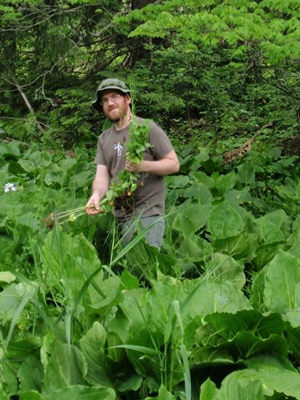Invasive species are a major threat to Pennsylvania’s native plants and animals. Introduced to an area outside their native range, invasive species compete with native species for space and resources. They can alter habitats, impact the economy and introduce disease.
Amy Jewitt, WPC’s iMapInvasives program coordinator with the Pennsylvania Natural Heritage Program, shares tips for controlling invasive species.
- Challenge yourself to learn about invasive species, even the ones that aren’t yet in our state. Check out the Invader Watchlist.

- Use PA iMapInvasives to report invasive species. Create a login account at paimapinvasives.org, or record data through a mobile app or use a public report form.
- Learn to identify invasive species before buying plants or removing them from your property. The Pennsylvania Department of Conservation and Natural Resources and Penn State Extension have excellent identification and control resources.
- Volunteer during spring, summer and fall to control invasive plants on WPC’s preserves, or at Fallingwater.
- Plant native plants in your yard or garden containers. Our native wildlife and insects have evolved to require native plants.
- Never release an unwanted pet or plant into the wild.
- Watch “Seeing The Unseen: Aquatic Invaders & What’s at Stake,” a short film that highlights the many negative impacts of aquatic invasive species on Lake Erie.
- Watch “Green Isn’t Always Good,” our free recorded webinar about identifying invasive species and planting natives.
- Ask local greenhouses to stock specific natives and take invasive species out of circulation.
- Before purchasing container plants at a greenhouse or swapping a plant with a friend, check the plants’ soil for signs of invasive species, such as jumping worms.
- After camping or hiking, clean your shoes, socks, pantlegs, bike tires and equipment with a small brush. Some parks and preserves provide boot brushes at trailheads. Clean pets too.
- Wipe down boats and equipment with a dry rag after boating. Remove plant fragments.
- Properly dispose of all unused bait.
- Verify the bait you purchase is not an invasive species.
- Share your knowledge, and teach children about invasive plants and animals so identification becomes second nature!
###
About the Western Pennsylvania Conservancy:
The Western Pennsylvania Conservancy (WPC) enhances the region by protecting and restoring exceptional places. A private nonprofit conservation organization founded in 1932, WPC has helped establish 11 state parks, conserved more than 285,000 acres of natural lands, protected or restored more than 3,000 miles of rivers and streams, and assessed thousands of wildlife species and their habitats. The Conservancy owns and operates Frank Lloyd Wright’s Fallingwater, which is on the UNESCO World Heritage List and symbolizes people living in harmony with nature. In addition, WPC enriches our region’s cities and towns through 130 community gardens and other green spaces and thousands of trees that are planted with the help of more than 7,000 volunteers. The work of the Conservancy is accomplished through the support of more than 10,000 members. For more information, visit WaterLandLife.org or Fallingwater.org.
